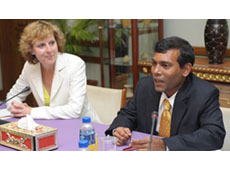Democracy in the Maldives is in a crucial phase and needs to prove to the people that it is able to guarantee liberty, according an independent evaluation of the European Commission’s €26.3 million (US$36.6 million) assistance package to the Maldives over the last 10 years.
“The political, administrative, and judicial system needs reforming in order to implement constitutional guarantees and requirements,” the report found.
“The passing of an important number of bills has been delayed in parliament, which is composed predominately of newcomers to politics and in which the opposition coalition has the majority – resulting in the problem of consensus having to be reached between the government and its parliamentary opposition.”
As a consequence, the country was under pressure to provide a functioning political, judicial and local governance system, the EC report noted, identifying two major areas of reform: the judicial sector (including police and prisons), “and the decentralisation reform, beginning with the local [council] elections.”
The independent evaluation was commissioned by the EC to critique its funding of programs between 1999 to 2009, which have included support for the empowerment of women, over €15 million in tsunami-related assistance, technical support for the presidential and parliamentary elections, island waste management centres and more recently, pledges off €6.5 million for climate change adaption and mitigation support, as well as €1.3 million earmarked for combating drug abuse.
The report was presented at Holiday Inn yesterday to a cross section of stakeholders including government officials, civil society, international donor organisations and the press.
Overall achievement of executives was described as “mixed”. The strategic planning of many programmes was “too ambitious given the level of available funding”, the report noted, with gaps between planning and implementation.
“The environmental support program was too ambitiously planned and had to be scaled down to solid waste management only,” the report stated. “Constructed island waste management systems are, with few exceptions, not operational, and waste management centres are unequipped.”
The failings of this project were due in part to “technical” problems, including design weaknesses and missing equipment, “and insufficient involvement of communities in general, notably the Island Women Development committees.”
“Women on the islands are quite well organised and are often the main actors in terms of environmental issues and social and economic life. Many households are managed by women, as men are often working in the tourist resorts, in the fisheries industry, or abroad,” the report observed.
“However the present local governance structures generally do not sufficiently allow women to play an effective role in the local decision-making process.”
Equipment for the island waste management systems, purchased with the project’s remaining funding, remains stored in Male’, the report noted.
Economic vulnerability
The EC had identified the Maldives’ reliance on a single export commodity as a fundamental weakness in its commodity, but plans to diversify these exports “were too ambitious an objective for EC support.”
The problem was going to exacerbate when the Maldives graduates from Less Developed Country (LDC) status in January 2011, the report noted, when it will lose preferential market access and technical and financial support from multilateral and regional sources. This will have particular impact on the country’s trade with Sri Lanka and Thailand.
“Maldives exports can be built up and diversified only if action is taken to resolve serious supply-side issues in the economy, including access to investment finance, improvement of production procedures and standards, training of the workforce, development of modern marketing principles, and improvement of transport infrastructure.”
Programmes identified as successful by the EC report included that allocated to the presidential and parliamentary elections, which produced “a positive perception of the EC as a recognised political partner in the democratisation process.”
Looking ahead, the report suggested ensuring that projects had clearer objectives and were realistically planned, and preferably managed from within the country rather than outside.
It also recommended greater strategic focus on no more than two areas of priority, “such as environment/climate change and the good governance/decentralisation sector”.
Ambassador and Head of Delegation of the European Union Delegation to Sri Lanka and the Maldives, Bernard Savage, observed that programmes run in cooperation with other donors such as the World Bank and UN Agencies had been the most successful.
“Programmes carried out under this collaboration have been reviewed as both effective and efficient in general,” he said.
 (0)Dislikes
(0)Dislikes (0)
(0)